By Katherine McGinity · Wednesday, June 20, 2012 As an occasional feature on TELOSscope, we highlight a past Telos article whose critical insights continue to illuminate our thinking and challenge our assumptions. Today, Katherine McGinity looks at Jim Vernon’s “American Antigone: Hegelian Reflections on the Sheehan-Bush Conflict,” from Telos 144 (Fall 2008).
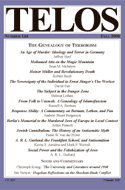 With the departure of the last American troops from Iraq, we can shift our perspective on the war from current event to one of history. Jim Vernon’s 2008 article “American Antigone: Hegelian Reflections on the Sheehan-Bush Conflict” was written in the midst of the war and just as Cindy Sheehan was moving herself out of the public eye. Now is an interesting time to revisit the dramatic conflict that ensued between Sheehan and George W. Bush and the ideological camps that formed around them. With the departure of the last American troops from Iraq, we can shift our perspective on the war from current event to one of history. Jim Vernon’s 2008 article “American Antigone: Hegelian Reflections on the Sheehan-Bush Conflict” was written in the midst of the war and just as Cindy Sheehan was moving herself out of the public eye. Now is an interesting time to revisit the dramatic conflict that ensued between Sheehan and George W. Bush and the ideological camps that formed around them.
Continue reading →
By Frederick Wertz · Friday, June 15, 2012 As an occasional feature on TELOSscope, we highlight a past Telos article whose critical insights continue to illuminate our thinking and challenge our assumptions. Today, Frederick Wertz looks at Franklin Adler’s “The Original Model of American Democracy and the Turn to Statism,” from Telos 104 (Summer 1995).
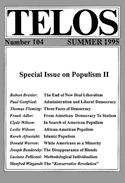 In his well-known visit to the United States, Alexis de Toqueville was particularly struck by the invisibility of the American state: “Nothing strikes a European traveler in the United States more than the absence of what we would call government or administration. One knows that there are written laws there and sees them put into execution every day; everything is in motion around you, but the motive force is nowhere apparent.” At the time of his visit, the state governments of Europe were indeed gargantuan compared to that of the newly founded state across the pond. While such a gap used to be the main distinguishing characteristic between governments of the old world and new, few would disagree that today this gap has closed significantly. For better or worse, the government of the United States has taken a decidedly statist turn from its original model. In his well-known visit to the United States, Alexis de Toqueville was particularly struck by the invisibility of the American state: “Nothing strikes a European traveler in the United States more than the absence of what we would call government or administration. One knows that there are written laws there and sees them put into execution every day; everything is in motion around you, but the motive force is nowhere apparent.” At the time of his visit, the state governments of Europe were indeed gargantuan compared to that of the newly founded state across the pond. While such a gap used to be the main distinguishing characteristic between governments of the old world and new, few would disagree that today this gap has closed significantly. For better or worse, the government of the United States has taken a decidedly statist turn from its original model.
Continue reading →
By Wes Tirey · Thursday, June 14, 2012 As an occasional feature on TELOSscope, we highlight a past Telos article whose critical insights continue to illuminate our thinking and challenge our assumptions. Today, Wes Tirey looks at Alain de Benoist’s “Democracy Revisited,” from Telos 95 (Spring 1993).
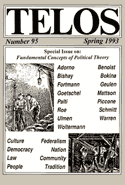 In his book Radical Democracy, C. Douglas Lummis writes that democracy is a “whore among political words.” Indeed, anyone who sees the ideals of inclusionary dialogue and autonomy that democracy is supposed to represent juxtaposed with the “democratic” endeavors of certain political actors knows quite well that democracy and its meaning are in desperate need to be revisited. Alain de Benoist does just that in his article “Democracy Revisited.” In his book Radical Democracy, C. Douglas Lummis writes that democracy is a “whore among political words.” Indeed, anyone who sees the ideals of inclusionary dialogue and autonomy that democracy is supposed to represent juxtaposed with the “democratic” endeavors of certain political actors knows quite well that democracy and its meaning are in desperate need to be revisited. Alain de Benoist does just that in his article “Democracy Revisited.”
Continue reading →
By Tomash Dabrowski · Tuesday, May 29, 2012 As an occasional feature on TELOSscope, we highlight a past Telos article whose critical insights continue to illuminate our thinking and challenge our assumptions. Today, Tomash Dabrowski looks at Karl Korsch’s “Ten Theses on Marxism Today,” from Telos 26 (Winter 1975–76).
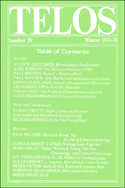 Although the work of Karl Korsch was cardinal to subsequent theoretical developments within the twentieth-century Marxist canon, the appreciation of his work is usually eclipsed in intellectual history by the long shadow cast by Lukács over the development of what would later be called “Western Marxism.” Nevertheless, the belated rediscovery of Korsch’s work by the New Left was certainly in part due to the fact that Korsch’s position was the more heretical in the eyes of the Soviet variant of Marxist orthodoxy. Although Lukács dismissed the dogmatic hagiography of Marx’s conclusions, he nevertheless introduced his magnum opus, History and Class Consciousness, with the “scientific conviction” in the method of dialectical materialism. Even provided that all of Marx’s findings would be proven false, genuine Marxist method would nevertheless yield a privileged relationship to history. Although the work of Karl Korsch was cardinal to subsequent theoretical developments within the twentieth-century Marxist canon, the appreciation of his work is usually eclipsed in intellectual history by the long shadow cast by Lukács over the development of what would later be called “Western Marxism.” Nevertheless, the belated rediscovery of Korsch’s work by the New Left was certainly in part due to the fact that Korsch’s position was the more heretical in the eyes of the Soviet variant of Marxist orthodoxy. Although Lukács dismissed the dogmatic hagiography of Marx’s conclusions, he nevertheless introduced his magnum opus, History and Class Consciousness, with the “scientific conviction” in the method of dialectical materialism. Even provided that all of Marx’s findings would be proven false, genuine Marxist method would nevertheless yield a privileged relationship to history.
Continue reading →
By Sunil Kumar · Monday, April 30, 2012 As an occasional feature on TELOSscope, we highlight a past Telos article whose critical insights continue to illuminate our thinking and challenge our assumptions. Today, Sunil Kumar looks at Jean-François Lyotard’s “Adorno as the Devil,” from Telos 19 (Spring 1974).
Jean-François Lyotard, as the title of his essay “Adorno as the Devil” indicates, attempts to take Adorno and the “radical” Marxism of the Frankfurt School by the horns. The chosen apparatus for the purpose is his analysis of Thomas Mann’s last novel, Doctor Faustus, first published in 1947 as well as Adorno’s magnum opus, Aesthetic Theory:
Continue reading →
By Juan Carlos Donado · Wednesday, April 25, 2012 As an occasional feature on TELOSscope, we highlight a past Telos article whose critical insights continue to illuminate our thinking and challenge our assumptions. Today, Juan Carlos Donado looks at David Buxton’s “Rock Music, the Star-System and the Rise of Consumerism,” from Telos 57 (Fall 1983).
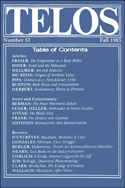 From its origin to its social significance, almost everything about rock and roll music remains steeped in fierce debate. Exactly when and where was it born? Who, if in fact there is one only, is rock’s founding figure? What exactly did it and does “rock and roll” mean? Although all of them amount to approximations, certain answers have become commonplaces: it was born with bluesman Robert Johnson, with Chuck Berry, with Jerry Lee Lewis, with Elvis Presley, in the Mississippi Delta, in Memphis, and its sound was crafted by means of the technological breakthrough of the electric guitar. It signifies the rebelliousness of a generation, the nonconformity of the young, the break with the status quo. Yet rock and roll’s relationship with capitalism cannot be more complex. From its origin to its social significance, almost everything about rock and roll music remains steeped in fierce debate. Exactly when and where was it born? Who, if in fact there is one only, is rock’s founding figure? What exactly did it and does “rock and roll” mean? Although all of them amount to approximations, certain answers have become commonplaces: it was born with bluesman Robert Johnson, with Chuck Berry, with Jerry Lee Lewis, with Elvis Presley, in the Mississippi Delta, in Memphis, and its sound was crafted by means of the technological breakthrough of the electric guitar. It signifies the rebelliousness of a generation, the nonconformity of the young, the break with the status quo. Yet rock and roll’s relationship with capitalism cannot be more complex.
Continue reading →
|
|
 With the departure of the last American troops from Iraq, we can shift our perspective on the war from current event to one of history. Jim Vernon’s 2008 article “American Antigone: Hegelian Reflections on the Sheehan-Bush Conflict” was written in the midst of the war and just as Cindy Sheehan was moving herself out of the public eye. Now is an interesting time to revisit the dramatic conflict that ensued between Sheehan and George W. Bush and the ideological camps that formed around them.
With the departure of the last American troops from Iraq, we can shift our perspective on the war from current event to one of history. Jim Vernon’s 2008 article “American Antigone: Hegelian Reflections on the Sheehan-Bush Conflict” was written in the midst of the war and just as Cindy Sheehan was moving herself out of the public eye. Now is an interesting time to revisit the dramatic conflict that ensued between Sheehan and George W. Bush and the ideological camps that formed around them.  In his well-known visit to the United States, Alexis de Toqueville was particularly struck by the invisibility of the American state: “Nothing strikes a European traveler in the United States more than the absence of what we would call government or administration. One knows that there are written laws there and sees them put into execution every day; everything is in motion around you, but the motive force is nowhere apparent.” At the time of his visit, the state governments of Europe were indeed gargantuan compared to that of the newly founded state across the pond. While such a gap used to be the main distinguishing characteristic between governments of the old world and new, few would disagree that today this gap has closed significantly. For better or worse, the government of the United States has taken a decidedly statist turn from its original model.
In his well-known visit to the United States, Alexis de Toqueville was particularly struck by the invisibility of the American state: “Nothing strikes a European traveler in the United States more than the absence of what we would call government or administration. One knows that there are written laws there and sees them put into execution every day; everything is in motion around you, but the motive force is nowhere apparent.” At the time of his visit, the state governments of Europe were indeed gargantuan compared to that of the newly founded state across the pond. While such a gap used to be the main distinguishing characteristic between governments of the old world and new, few would disagree that today this gap has closed significantly. For better or worse, the government of the United States has taken a decidedly statist turn from its original model.  In his book Radical Democracy, C. Douglas Lummis writes that democracy is a “whore among political words.” Indeed, anyone who sees the ideals of inclusionary dialogue and autonomy that democracy is supposed to represent juxtaposed with the “democratic” endeavors of certain political actors knows quite well that democracy and its meaning are in desperate need to be revisited. Alain de Benoist does just that in his article “Democracy Revisited.”
In his book Radical Democracy, C. Douglas Lummis writes that democracy is a “whore among political words.” Indeed, anyone who sees the ideals of inclusionary dialogue and autonomy that democracy is supposed to represent juxtaposed with the “democratic” endeavors of certain political actors knows quite well that democracy and its meaning are in desperate need to be revisited. Alain de Benoist does just that in his article “Democracy Revisited.”  Although the work of Karl Korsch was cardinal to subsequent theoretical developments within the twentieth-century Marxist canon, the appreciation of his work is usually eclipsed in intellectual history by the long shadow cast by Lukács over the development of what would later be called “Western Marxism.” Nevertheless, the belated rediscovery of Korsch’s work by the New Left was certainly in part due to the fact that Korsch’s position was the more heretical in the eyes of the Soviet variant of Marxist orthodoxy. Although Lukács dismissed the dogmatic hagiography of Marx’s conclusions, he nevertheless introduced his magnum opus, History and Class Consciousness, with the “scientific conviction” in the method of dialectical materialism. Even provided that all of Marx’s findings would be proven false, genuine Marxist method would nevertheless yield a privileged relationship to history.
Although the work of Karl Korsch was cardinal to subsequent theoretical developments within the twentieth-century Marxist canon, the appreciation of his work is usually eclipsed in intellectual history by the long shadow cast by Lukács over the development of what would later be called “Western Marxism.” Nevertheless, the belated rediscovery of Korsch’s work by the New Left was certainly in part due to the fact that Korsch’s position was the more heretical in the eyes of the Soviet variant of Marxist orthodoxy. Although Lukács dismissed the dogmatic hagiography of Marx’s conclusions, he nevertheless introduced his magnum opus, History and Class Consciousness, with the “scientific conviction” in the method of dialectical materialism. Even provided that all of Marx’s findings would be proven false, genuine Marxist method would nevertheless yield a privileged relationship to history.  From its origin to its social significance, almost everything about rock and roll music remains steeped in fierce debate. Exactly when and where was it born? Who, if in fact there is one only, is rock’s founding figure? What exactly did it and does “rock and roll” mean? Although all of them amount to approximations, certain answers have become commonplaces: it was born with bluesman Robert Johnson, with Chuck Berry, with Jerry Lee Lewis, with Elvis Presley, in the Mississippi Delta, in Memphis, and its sound was crafted by means of the technological breakthrough of the electric guitar. It signifies the rebelliousness of a generation, the nonconformity of the young, the break with the status quo. Yet rock and roll’s relationship with capitalism cannot be more complex.
From its origin to its social significance, almost everything about rock and roll music remains steeped in fierce debate. Exactly when and where was it born? Who, if in fact there is one only, is rock’s founding figure? What exactly did it and does “rock and roll” mean? Although all of them amount to approximations, certain answers have become commonplaces: it was born with bluesman Robert Johnson, with Chuck Berry, with Jerry Lee Lewis, with Elvis Presley, in the Mississippi Delta, in Memphis, and its sound was crafted by means of the technological breakthrough of the electric guitar. It signifies the rebelliousness of a generation, the nonconformity of the young, the break with the status quo. Yet rock and roll’s relationship with capitalism cannot be more complex. 

